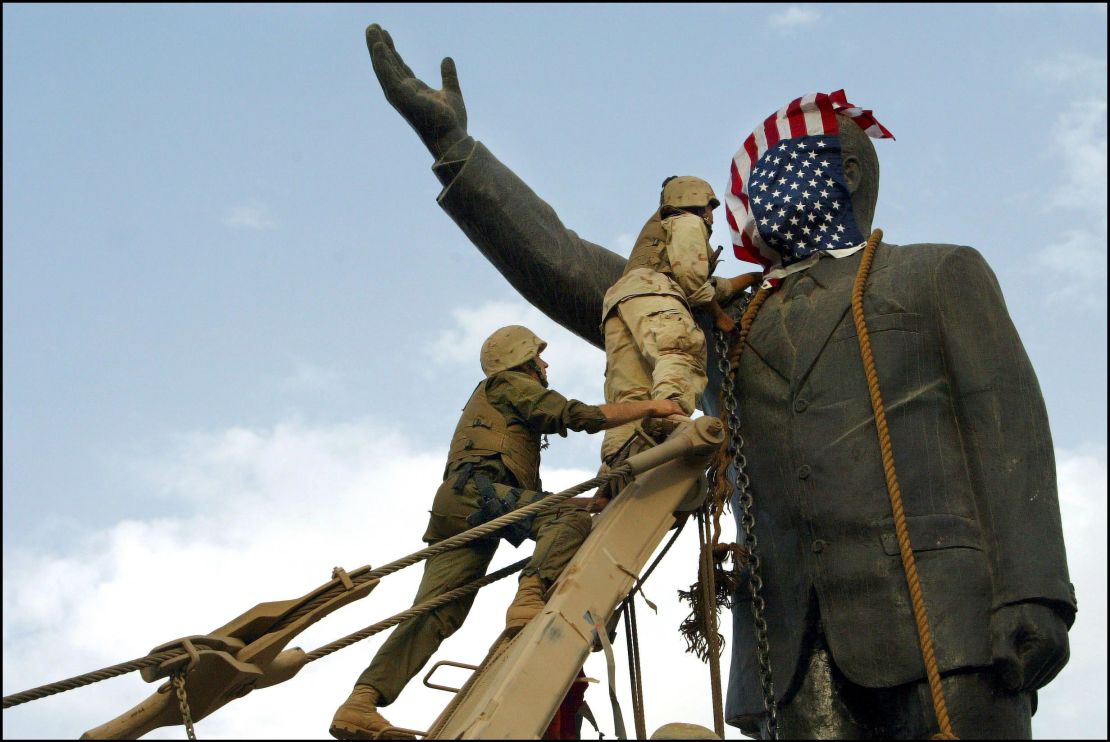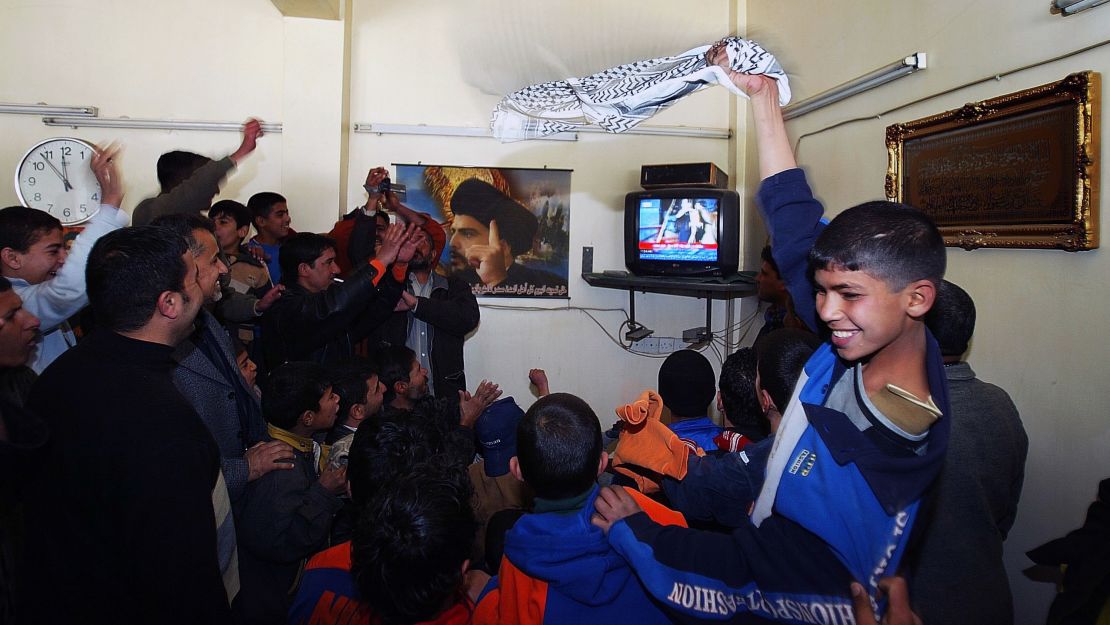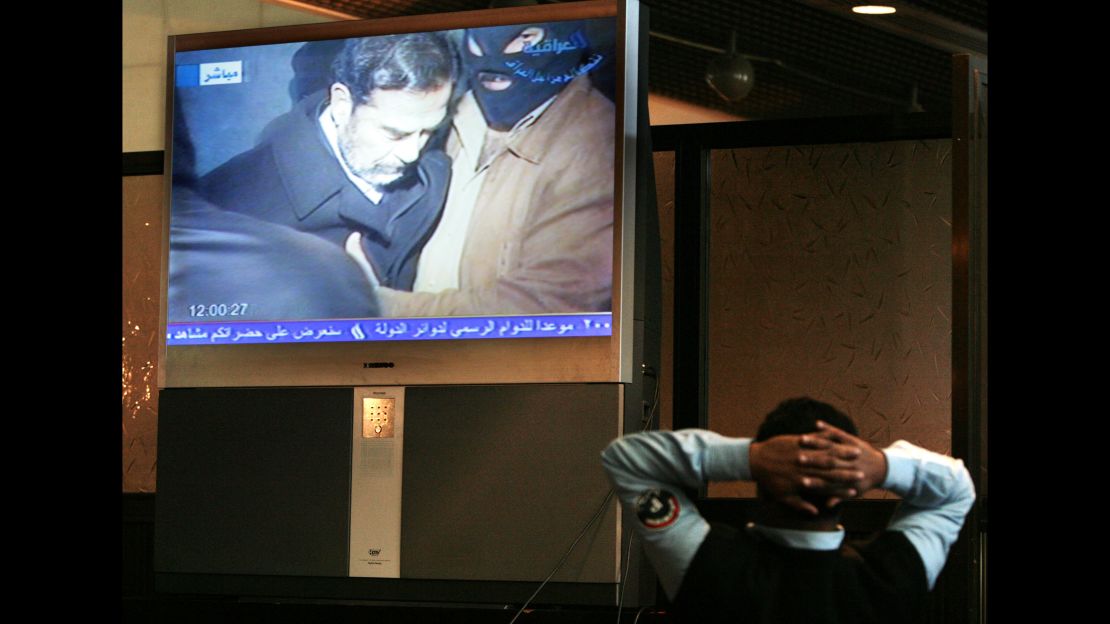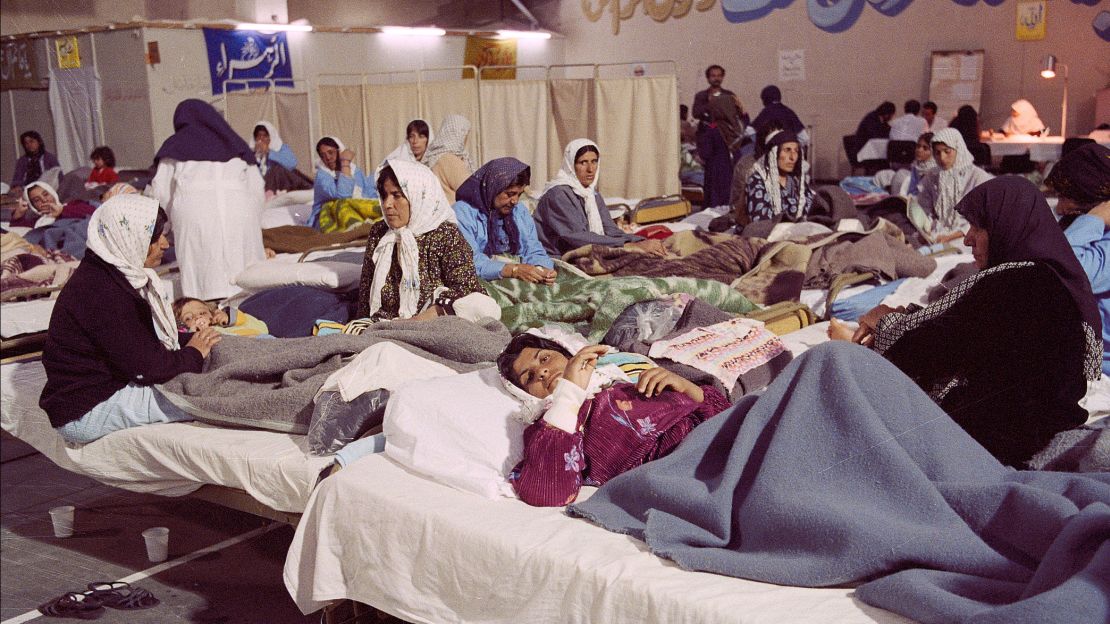Story highlights
Friday marks the 10th anniversary of Saddam Hussein's death
Iraqis spoke to CNN about their memories of that day
On the morning of the start of Eid al-Adha on December 30, 2006, Saddam Hussein was hanged to death for committing crimes against humanity.
It’s a day that will forever be entrenched in the memory of Iraqis who watched their ruthless leader walk towards the gallows and have a noose tightened around his neck.
Hussein, who ruled Iraq from 1979 until his overthrow and capture by a US-led coalition in 2003, was accused by an Iraqi court of committing numerous massacres during his rule. These included the 1982 slaughter of Shias in the town of Dujail and the 1988 Halabja massacre, in which he used chemical weapons against a Kurdish town that dared to rise against him.
Families of victims celebrated his death, while other Iraqis felt deeply saddened by the jarring footage of a vulnerable man who once was the president of their country.
A number of Iraqis, many of whom were children in 2006, spoke to CNN about their memories and feelings on the day Hussein was executed 10 years ago.
Amina Ahmad, 27
Ahmad was in her home in Mosul when Saddam Hussein was executed. While she believed the deposed leader was a dictator, she felt that his hanging was a punishment for all of Iraqis. Ahmad, an aid worker, now lives in Irbil after ISIS took over her city two years ago. This is what she remembers from the day Saddam was executed:
I was young. I had no interest in politics. I surely felt very sad. I started crying because it wasn’t about Saddam himself but I felt they executed Iraq. I know that Saddam Hussein was a dictator to be honest, but he represented Iraq, he was the president of Iraq. When other countries come in and take [Saddam] down and then they execute him, you feel like that’s it, Iraq is done. They executed the president, he represents your country and they kind of humiliated your country.
It was the same feeling [I got] when the US army came to Baghdad. There was big statue of Saddam. One of the US soldiers wiped Saddam’s face with the American flag and took it down. All of us were like ’ who is this person to take the statue down? This is our country, this is our own business.’ Because we didn’t ask for any of this. I know we were living under a dictator, but we didn’t ask anyone to come and do this damage to our country.
First, we were afraid of only one person, [Saddam]. If you don’t talk bad about him or his family, then you are safe. After that it was a complete chaos. The situation is not getting any better. I am from Mosul and you know how the situation is like. Everything is destroyed.

Zaid Ridha, 23
Ridha lives in Diwaniyah, a predominantly Shiite city located about 100 miles south of Baghdad. He was 13 when Saddam was executed.
I remember I woke up and found my dad having the TV on the Al Arabiya channel, and there were live scenes of Saddam Hussein’s execution. I said, ‘What!? The day has finally come.’ Nobody could ever believe that [it would come].
As I remember, it was a very special day, especially for my father and my family. We suffered a lot. I don’t know how to describe, but the joy was overwhelming everybody.
So everybody was in the street, and everybody was firing [gunshots in the air] in celebration. And everybody was smiling… so it was like a special day.
My dad said that he wanted his friends to see this day, the day they were all dreaming of, 35 years.
My father, my family felt that Saddam Hussein was not punished enough for his crimes. He has many, many terrible crimes. Not just only to Iraq, but also to our neighboring countries.
In the book we studied in primary school, the first page always had Saddam’s face. Between every 10 to 15 page there was a quote by Saddam Hussein… When the regime fell, I said wow, I will never have to see his face again.

Na’eem Al Zubaidi, 41
Al Zubaidi is a doctor and lecturer at the University of Kufa in Najaf, central Iraq. He was 31 when Hussein was executed. He recalls a celebratory atmosphere in a city that is considered one of the holiest for Shia Muslims whose residents were brutally oppressed under Saddam’s oppressive rule.
On the day of the execution, it was a holiday, so I was at home. There was an overwhelming celebratory spirit, especially here, you can expect, in Najaf, one of the cities that suffered the most from the oppressive tyranny of Saddam. There was shooting [in the air]. This is the usual habit of Iraqis everywhere to celebrate.
This was the first impression, but later, when the first videos from the execution came on TV, for me, it was a disappointment.
Saddam was a criminal, he deserved to die, but in a way that can achieve justice to the victims. Not in that way that was shown on Iraqi TV on that day.
At that moment you remember the people who suffered from Saddam Hussein … the people who you wish they were with you and witness the end of a dictator. I was from a family that did not have any relations to the politics … we were ordinary Iraqi family with no politics, but we also paid our share from the Saddam suffering. So, there were tears in the family, there was crying.

Surood Ahmad, 41
On that day in 2006 Ahmad, a Kurdish human rights activist, was in Halabja, the city that Saddam had hit with chemical weapons. She says people on the day felt they received retribution for the suffering they endured, but that she was shocked by how the media showed Saddam’s death.
As a human rights defender and as a member of the [Kurdish community], it hurts me to talk about this because I was one of the people displaced during the Saddam regime. I lost three members of my family.
On the other hand, now when I look at the community and how it was before compared to now – In the past we had one enemy, but now we have a hundred enemies and we don’t know who our enemies are.
But what we are cultivating now is from [Saddam], because he planted this during his period. He created hate between the Shia and the Arabs and the Sunnis and he brought the Arabs to kill the Kurdish people, and brought the Sunnis to kill the Shias. This was his long-term plan.
I didn’t like the way they [sentenced Saddam] and the way they hanged him. Despite all what I went through I didn’t like how the media showed his [execution]. He was our leader for a while.
Unfortunately on that day I was in Halabja, the city [where people were gassed] by chemical weapons. I saw people were so glad. They were so happy because they felt they got back their right on that day. [They said] this is the court decision and this is the right decision. I also went to Sulaymaniyah [another Kurdish area] on that day, and people were having a party.
But personally I was shocked by it.

Nivene, 28
Nivene, a Catholic Christian from Baghdad, was 18 when Saddam was executed. She left Iraq two years later, in 2008, and now lives in New Hampshire. She did not want her last name published.
I was home … I didn’t go anywhere. When he got executed we basically all watched it on the TV. We actually weren’t happy about his execution. When they aired it on TV, they didn’t air the whole thing … so what we did, we went on the Internet and we pulled it up online and that’s how we watched his execution. We weren’t happy. Most of my family started crying during his execution.
Saddam Hussein never hurt me or my family. He was the best thing that ever happened in Iraq and he will be the best thing that ever will happen to Iraq … he did some horrible things that he shouldn’t have done, and I don’t agree about that, but at the same time, the Iraqi people need someone like Saddam Hussein to rule them. Because as you can see right now – there’s no one in charge in Iraq and you can see what’s happening in Iraq.
My family and I are not Muslim, we’re Catholic, Christian Catholic. And Saddam Hussein didn’t allow anyone to touch anyone who was Christian or Catholic … right now all they’re trying to do is basically to kill Christian Catholic people, to kick them out, treating them like … basically they’re not treating us like humans, they’re killing us, they’re kicking us out from our houses. That didn’t happen when Saddam Hussein was in charge, so of course I’m going to get upset.

